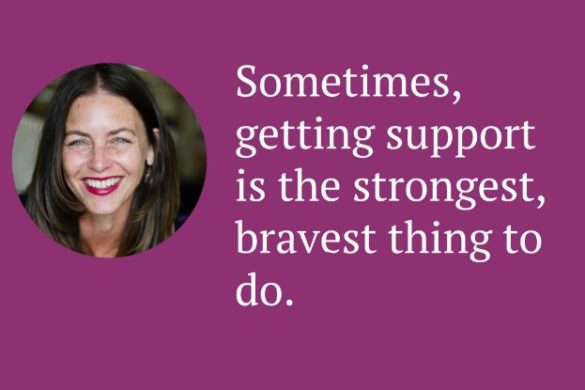Dear Money Adventurer,
Every single one of us is on our own one-of-a-kind money journey, tailor-made by our unique circumstances of family, upbringing, culture, and personal experience.
Still, after a decade of training to become a Somatic Therapist – and over twenty years as a Financial Therapist – there are a few things that I find myself saying over and over again, to my Art of Money students, in interviews, to my family, friends, and even myself sometimes.
No matter how different our journeys may be, there are certain themes and questions that we all struggle with at some point or another – and some tools that we could all benefit from!
So, I present to you…(drumroll please)
10 Things Your Financial Therapist Wants You to Know
1. Most of us never received an education in financial literacy or emotional literacy. No matter what background we come from. Yet our experiences and emotions around money shape our perceptions, opportunities, and our lives. So we need to develop the skills, tools, and language to unpack these emotions and explore our relationship with money. This is why I created my 3-phase Art of Money methodology, weaving together the practical, personal, emotional, psychological, and somatic – creating a comprehensive framework to support you every step of the way. Some of us need a more practical approach, others are looking for more psychological understanding, while still others need the outlet of a body-based practice, or a combination of all of the above! Every one of us is on our own unique journey.
2. Money is an emotional subject. On top of all the things we don’t know and never learned about money, so many challenging feelings come up here around ideas of value and worth, support and security, abundance and lack. From shame, guilt, and fear to excitement, hope, and joy, when we learn to name the emotions that come up for us around money and allow ourselves to be present with how we feel, we empower ourselves to heal the past and begin to write a new chapter in our money story.
3. Tough love is not the answer. If we want to create a genuinely healthy and sustainable relationship with money, we need to foster a safe space for healing, growth, and deeper self-knowing. That means showing up with love, grace, and compassion for ourselves and where we’re coming from. Be gentle with yourself. In reality, this is not as simple as it sounds. Please notice when you find yourself going down the self-critical road, and practice adding in some extra grace and compassion towards your self and your money patterns. Your future self will thank you.
4. Money shame is real, no matter our family lineage, culture, economic background, or bank account balance. Whether we’re caught up in blaming ourselves for so-called mistakes, decisions we wish we’d never made, or for being “bad with money,” we all carry internalized shame around money. It isn’t just you. But, with this simple tool, we CAN find the antidote to money shame.
5. You are not behind. You never were. You never will be. This is not a race. Every single one of us is on our own unique journey in life and money, and it is constantly unfolding, evolving as we grow. Where you are right now is perfectly on time. Honor your own pace with love and compassion. Baby step by baby step, you are forging your own path.
Simply by reading this, you are taking a brave step forward. Keep going.
6. Give yourself the support you need. You don’t have to do it all yourself. Hire a support team – you can’t be the expert at everything. Asking for help and allowing yourself to receive support can be deeply healing AND empower your growth and understanding. It can be overwhelming to try and figure out whether you need an accountant, a bookkeeper, a financial coach, or a financial planner, so here’s a guide to help you understand the different players on your financial team. This is a loving reminder that you are worthy of support.
7. Your body has a lot to say about money. The anxious butterflies in your stomach when you log in to check your bank accounts, the hot rush of fear when it’s time to talk finances with your honey, that scattered sensation that seems to crop up every time you have a meeting with your accountant – these physical responses are powerful messengers from your body. This is why somatic tools are essential in money and life. When we learn to sit with these sensations instead of resisting them, we reconnect with our bodies, grounding ourselves in the wisdom and new depths of self-knowing that they have to share.
8. Money can be deeply meaningful. More than just what you need to pay down debt, fill the gas tank, or buy those boots you’ve been drooling over, money offers a unique opportunity to align your spending, giving, and saving with your most cherished goals, hopes, and dreams. You can infuse your money relationship with your deepest values, empowering yourself to stand for what you believe in, invest in your community, and chart your own path in a way that honors your integrity, personal beliefs, and aspirations.
9. Your relationship with money has the power to transform your life – if you’ll let it. Money touches every part of our lives, from our values to our sense of worth, the work we do, the way that we show up in the world, our lineage, our personal relationships, communities, and what we believe is possible. Here we uncover the stories and beliefs that have been weaving an unconscious narrative through our lives and empower ourselves to release the patterns that no longer serve us. We write new stories with compassion, love, and hope for ourselves and the future. Each baby step ripples outward, like a pebble skipping across a pond, bringing greater understanding, authenticity, and intimacy to our lives and relationships.
10. You are not alone. Wherever you are in your money journey, whether you’re struggling through a valley in your money journey or celebrating a major milestone, whatever emotions come up for you as you read this, you are not alone. We all have challenging obstacles to overcome, lessons to learn, baby steps and brave leaps to celebrate. Even after 30 years of intentionally pursuing my own relationship with money, I still have moments when I struggle with my emotions – just ask me about estate planning! And I know that so many other folks have similar emotions, stories, and experiences, too.
Even when it feels like everyone except you learned about money and knows what they’re doing – it’s simply not true. Whenever someone asks a question in The Art of Money program, I know that it applies to at least 50 others in the community. We may think we are alone, or even feel alone at times, but please know that most of us have challenges and strengths around money. So many of us are going through, or have gone through, these moments of doubt, overwhelm, and uncertainty – we just don’t talk about it.
So here I am, writing you a love letter to say that it isn’t just you.
To tell you that you really, truly are not alone.
We’ve all been there.
Each and every one of us is constantly learning, forging our own paths with the tools we have as this journey unfolds before us, growing along the way.
But that’s why it is called a journey – there is no “finish line,” just the intentional pursuit of deeper growth, authenticity, self-knowing, and savvy money skills.
Yes, there will be moments of uncertainty, challenging emotions, and self-doubt, but there will also be sparkling moments of clarity, self-discovery, and empowering achievement.
We will meet them all with love, compassion, and tender curiosity.
Also, after writing this list I quickly realized that the list was twice as long as I thought it would be. Head here for 11 More Things Your Financial Therapist Wants You to Know
This is the gentle path and all of you is welcome here.






